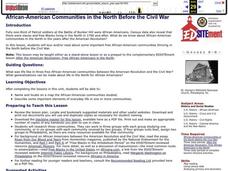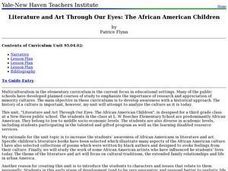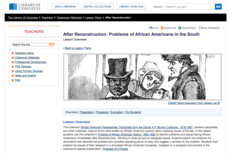Curated OER
African-American Communities in the North Before the Civil War
Students examine what life was like in free African-American communities before the Civil War. They analyze maps, identify elements of everyday life in these communities, explore various websites, and complete a chart.
Curated OER
African American Women Before and After the Civil War: Slavery and Freedom
Students listen to data on African American women in Texas before the Civil War. In this Civil War lesson, students compare and contrast the lives of slave and free women, and discuss case studies, locating areas on a map. Students...
Curated OER
Literature and Art Through Our Eyes: African-American Artists
Examine the contributions of African-Americans in the worlds of art and literature. Over the course of a few days, young scholars will read and analyze a poem, a short story, and a piece of art. They complete a range of...
Curated OER
"In Defense of My Race and Country": African-American Soldiers on Why They Are Fighting
Why would an African-American slave fight in the Civil War? Read and analyze primary source documents to understand the ex-slave perspective on fighting in the Union Army. Everything to complete this lesson is included.
Curated OER
Debate: How Should African Americans Achieve Equality?
Each group is assigned a character to play in a mock debate. They read the provided materials, build an argument, and then debate their points of view as their perspective character. The debate focuses on ensuring equality for...
Curated OER
Traditional African Society
Engaging your class in African culture and traditions, this presentation provides photographs, historical contexts, and societal structures from different African tribes. It poses discussion topics about the benefits and disadvantages of...
American Institute of Physics
African Americans and Life in a Secret City
Imagine the lure of being offered a job at a secret site, working on a secret project, and earning higher wages! Such was the approach used to recruit African Americans to Hanford, Washington, one of several sites used to develop...
National Woman's History Museum
African American Activists
Ida B. Wells, Rosa Parks, and Fannie Lour Hammer are three African American activists who stood up for change. Though living in different time periods, all three women sought justice and equality. Class members examine primary source...
National Endowment for the Humanities
African-American Communities in the North Before the Civil War
Middle schoolers may be surprised to learn that before the American Civil War there were more slaves living in New York than there were in Kentucky! Young historians examine maps and census data to gather statistics about...
Curated OER
Word Search: African Birds
Here is a beautiful word search on African bird species. There are 17 birds altogether, and each one has an accurate and colorful illustration that goes along with it. An answer key is included. This word search would come in handy to...
American Institute of Physics
African Americans and the Manhattan Project
A lesson about the Manhattan Project will explode young physicists' understanding of the racial attitudes in the United States during and after World war II. Groups select an African American scientist or technician that worked on the...
Academy of American Poets
The African American Experience
Disrespect can be as subtle as a frown or a turn of a head. To prepare for a study of Toi Derricote's poem "The Weakness" class members create wordless skits that demonstrate subtle or not so subtle signs of disrespect. After a...
Curated OER
African Nearshore Birds
Here is an exciting word search depicting African nearshore birds! Each of the 15 birds that must be found, is pictured in colorful form. A solution to the word search accompanies the worksheet. Very nice!
Curated OER
How were European nations capable of dominating the African contintnt?
Help your class determine why European was able to dominate the African continent. They read 5 excerpts, each related to a reason why Europe colonized Africa. Then they answer 4 critical-thinking questions.
Curated OER
The Causes and Effects of African Migration
Use the Bantu tribe of Africa to better understand why people migrate. This case study provides simple vocabulary and questions that focus on the causes and effects of African migration. Note: Adobe presenter is required to open this...
American Institute of Physics
Meet Four Pioneering African American Astronauts
An out-of-this-world resource introduces young scientists to four African American astronauts: Michael P. Anderson, Ronald E. McNair, Guion S. Bluford Jr., and Jeanette J. Epps. Groups read biographies of these individuals and prepare...
Curated OER
Day to Day Life in a Small African Village
Students analyze life in a village of Tanzania including its language, geography, health, and hygiene issues. In this African village lesson plan, students locate Tanzania and its capital city on a map. Students compare aspects...
North Carolina Consortium for Middle East Studies
Missing Pieces of the Puzzle: African Americans in Revolutionary Times
What's missing from most studies of the American Revolutionary War is information about the role African Americans played in the conflict. To correct this oversight, middle schoolers research groups like the Black Loyalists and ...
Center for Instruction, Technology, & Innovation
Did African American Lives Improve After Slavery?
The Civil War made slavery illegal, but all ex-slaves were not totally free. Scholars visit eight different classroom stations to uncover life during the Reconstruction Era in America. Groups discover items such as Black Codes, 13th,...
NET Foundation for Television
1850-1874 African American Settlers
Go West, young man! Scholars investigate the impact of African American settlers moving to the Nebraska territory, following the passage of the Kansas-Nebraska Act in the mid 1800s. Using primary sources, timelines, maps, and...
Miama-Dade County Public Schools
African Americans and the Civil War
The American Civil War is the theme of this packet of materials prepared for Black History Month. Class members learn about the roles that African Americans played during the Civil War and examine the African-American...
Smithsonian Institution
African American Music: Let’s Sing and Play Clapping Games
Two lessons focus on making a beat. Using popular African American music of its time, scholars listen and analyze the rhythm then recreate it with hands drums, and cups.
Library of Congress
After Reconstruction: Problems of African Americans in the South
Lynchings, race riots, and Jim Crow laws were just a few examples of antagonism that African Americans faced after Emancipation. Class groups investigate these and other events, and prepare a presentation to inform the class about...
Smithsonian Institution
Art to Zoo: Life in the Promised Land: African-American Migrants in Northern Cities, 1916-1940
This is a fantastic resource designed for learners to envision what it was like for the three million African-Americans who migrated to urban industrial centers of the northern United States between 1910 and 1940. After reading a...

























